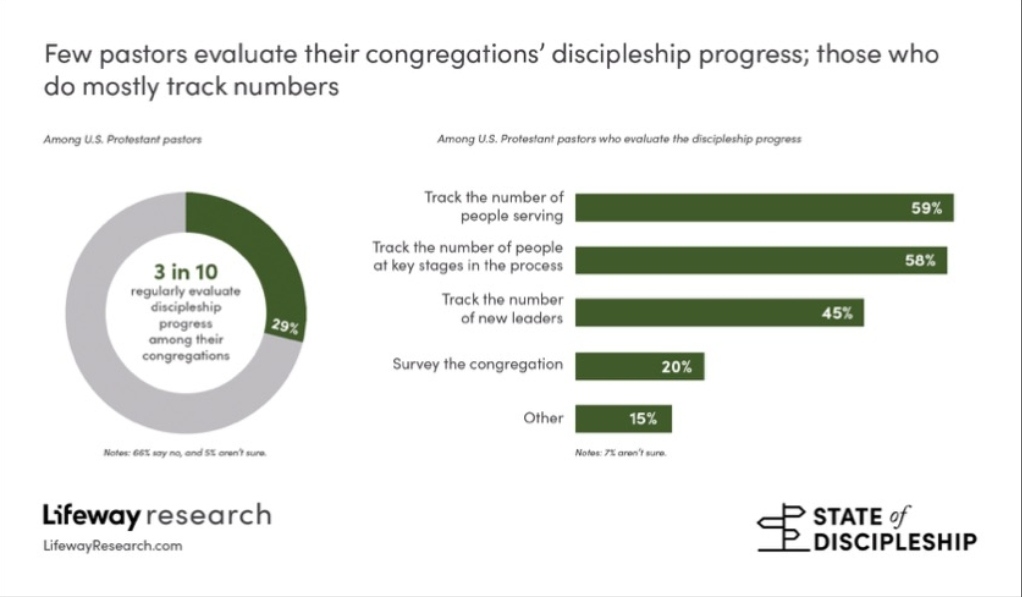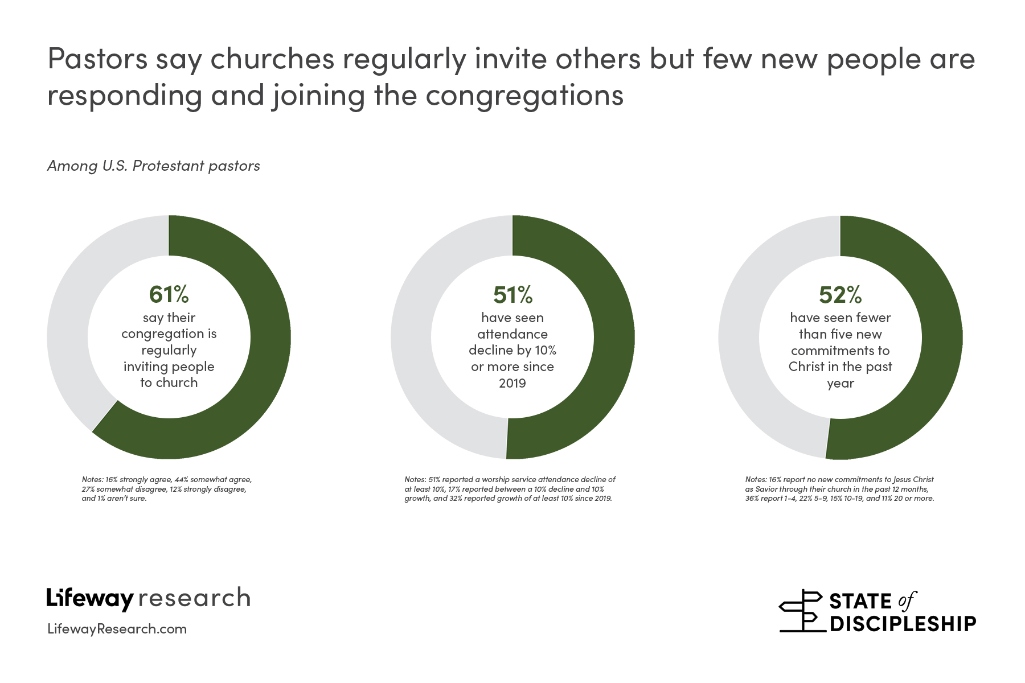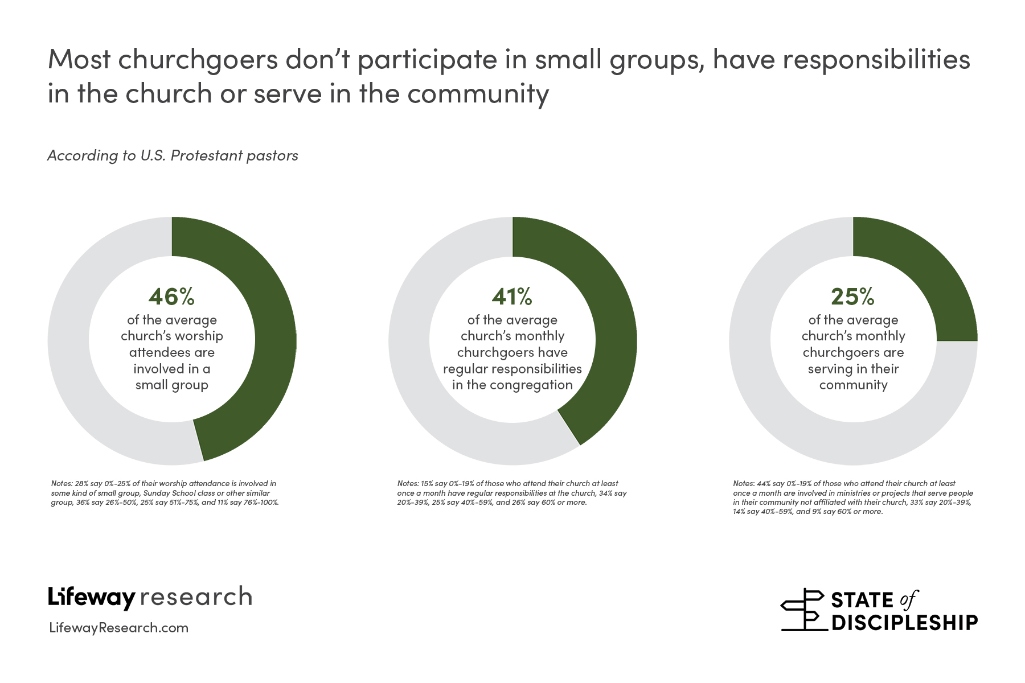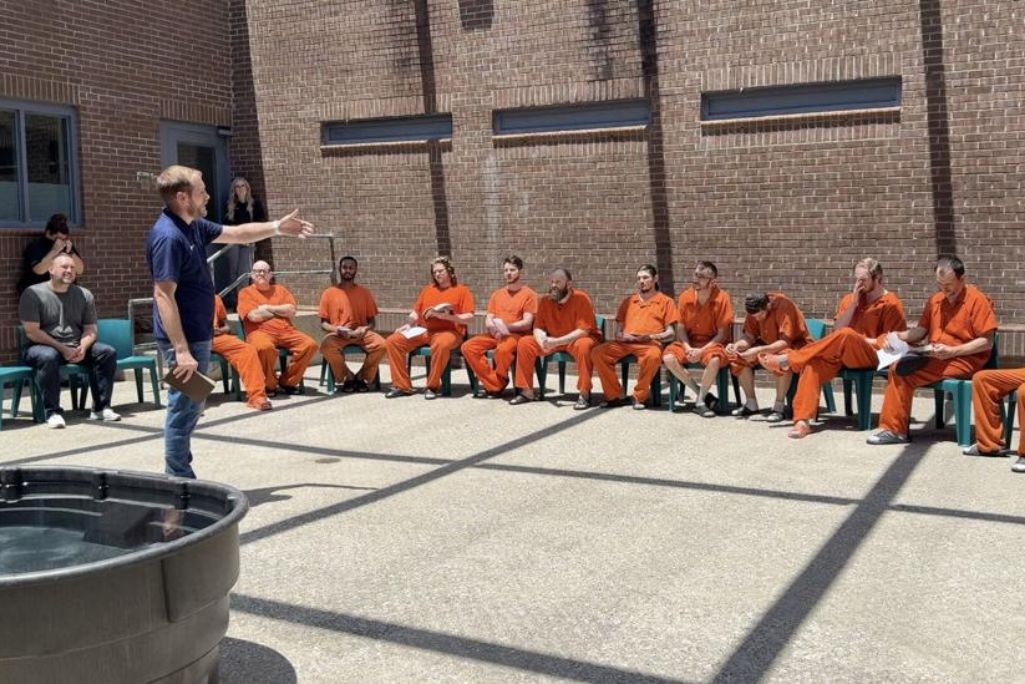
BRENTWOOD, Tenn. — Most pastors are confident their churches are helping people grow as Christians. Just don’t ask them how they know that.
In the second part of the State of Discipleship study from Lifeway Research, U.S. Protestant pastors describe their congregations’ discipleship approaches and reveal data behind some key spiritual growth metrics.
Half of pastors (52%) say they have an intentional plan for discipling individuals in their congregations and encouraging their spiritual growth. Similarly, 52% are satisfied with the state of discipleship in their church, including just 8% who strongly agree. Additionally, only 30% say their church has specific methods for measuring discipleship, even though 71% believe there are methods to track spiritual growth in a congregation.
“Churches have good intentions and efforts to help people grow spiritually; but without intentionality and evaluation, discipleship won’t be improved,” said Scott McConnell, executive director of Lifeway Research. “More than 9 in 10 pastors admit spiritual formation could improve in their congregation and that they won’t be completely satisfied with discipleship in their church until it does. They recognize the church flourishes when disciples are being formed.”
Effective evaluation
Around half of pastors feel generally confident in their discipleship strategy, but few are actually ensuring discipleship is taking place in their congregations.

Half (49%) believe their church discipleship strategy is effective, including only 7% who strongly agree. More than 2 in 5 (42%) disagree, 2% aren’t sure, and 7% admit they don’t have a discipleship strategy in their church.
White pastors (48%) and African American pastors (45%) are less likely than Hispanic pastors (62%) and pastors of other ethnicities (72%) to say their strategy is effective. Additionally, pastors of churches with 250 or more in attendance (67%) and churches started since 2000 (71%) are among the most likely to believe in the effectiveness of their discipleship plans.
Despite half of pastors asserting they have an effective strategy, just 29% say they regularly evaluate the discipleship progress among their congregants. Two in 3 (66%) say they aren’t consistently evaluating churchgoers’ spiritual growth.
Many of the pastors who were most likely to say their strategies are effective have the evaluations to support their claims. Hispanic pastors (43%), pastors of other ethnicities (50%), those at churches with 250 or more in attendance (53%) and those at churches established in the past 25 years (45%) are among the most likely to say they regularly evaluate discipleship progress among churchgoers.
Among those who evaluate the discipleship progress, most say as part of that, they track the number of people serving (59%) and the number of people at key stages in the process (58%). Slightly less than half (45%) track the number of new leaders. One in 5 (20%) survey the congregation, while 15% say they do something else, and 7% aren’t sure.
“Effective discipleship includes intentionality,” McConnell said. “New churches tend to be intentional about what they do as they are forced to focus on essentials. It’s not surprising that they are more likely to have an intentional plan for discipleship and more likely to describe their strategies as effective.”
Congregational metrics
As pastors think about discipleship in their churches, they may not be tracking spiritual growth, but they know some key numbers within their congregations.

Half of U.S. Protestant churches are shrinking. Comparing worship service attendance in fall 2019 to fall 2024, 51% of pastors say their churches have declined by 10% or more. Around 1 in 6 (17%) have plateaued, staying within plus or minus 10% of their 2019 attendance. A third of churches (32%) have grown by at least 10% since 2019.
The lack of attendance growth is not from a lack of trying by many churches. According to pastors, 61% of congregations regularly invite people they meet to church. Still, the median congregation has seen four people indicate a new commitment to Jesus Christ as Savior through the church in the past 12 months. Around a quarter (26%) say 10 or more have made a new profession of faith, while 16% say they’ve had no new commitments in the last year.
“Jesus Christ commanded His followers to share who He is and what He did with everyone. He didn’t promise how many or how quickly people would respond to this good news, but the faithfulness of each believer and each congregation participating in sharing the gospel is a worthy metric,” McConnell.
The average U.S. Protestant church has 46% of their weekend worship attendance also involved in a small group, Sunday school class or similar group. More than a third (37%) say at least half of churchgoers are also group participants.
Pastors say their churchgoers are almost twice as likely to be serving in the congregation as in the community.
In the average church, 41% of attendees have regular responsibilities, like teaching a class, serving in child care or greeting people at entrances. A quarter of churches (26%) have 60% or more of churchgoers regularly serving in some way.
Meanwhile, 25% of congregants in the average church are involved in ministries or projects not affiliated with the church that serve people in the community. Around 1 in 10 churches (9%) say 60% or more are serving, while 44% say that’s the case for less than 20% of their people.
“Living as people who have been sent by Jesus Christ to share the gospel requires activity, so measuring these efforts tells an important part of the story. But there are harder things to measure, such as the extent to which we are genuinely loving the neighbors we share with or serve and the extent to which we are trusting God to transform people around us,” said McConnell.
Discipleship responsibilities
In 3 in 5 churches (61%), at least one person is responsible for the discipleship programs, including 14% who say multiple paid staff members, 20% one full-time staff member, 7% one part-time staff member and 20% an unpaid volunteer. Almost 2 in 5 pastors (38%) say no one at their church has this responsibility.

The smaller the church, the more likely they are to say they don’t have anyone responsible for discipleship programs. A quarter (24%) of pastors at churches with 250 or more in attendance say that is the case in their congregation, compared to 31% at churches with 100 to 249, 41% at churches with 50 to 99 and 50% of churches with fewer than 50 people in attendance.
Still, most pastors believe they are emphasizing important spiritual growth principles and creating a space where discipleship can happen.
More than 4 in 5 (84%) say their church emphasizes the discipleship principles each believer should live out, including 35% who strongly agree. Additionally, 3 in 4 (76%) believe their church creates environments that effectively encourage discipleship, including 24% who strongly agree.
This looks different, however, at churches on the extremes of worship service attendance. Pastors of churches with 250 or more are the most likely to say they emphasize spiritual growth principles that every believer should live out (95%) and to believe their church creates discipleship-encouraging environments (87%).
Meanwhile, pastors at the smallest churches, those with fewer than 50 in attendance, are the most likely to disagree that they emphasize those principles (22%) and create environments that effectively encourage discipleship (33%).
“The Bible teaches many specific aspects that are part of following Jesus, from things to believe, who we should be and what we should do,” said McConnell. “Any church, regardless of their size or resources, can be intentional about emphasizing key discipleship principles, but it’s hard to keep that a priority when there isn’t a leader with that focus.”
For more information, view the complete report and visit LifewayResearch.com/Discipleship.
Methodology
The survey of 2,620 Protestant pastors was conducted Sept. 10-30, 2024. Invitations were emailed to a probability sample of Protestant pastors who were recruited by phone using random samples selected from all Protestant churches. An oversample of Southern Baptist pastors was randomly selected from all Southern Baptist Convention churches with a pastor and an email listed. The 2,176 Baptist responses were weighted down to reflect their correct proportion of Protestant churches. Each survey was completed by the senior pastor, minister or priest at the church. Responses were weighted by region, church size and denominational category to more accurately reflect the population. The completed sample is 2,620 surveys. The sample provides 95% confidence that the sampling error does not exceed plus or minus 2.05%. This margin of error accounts for the effect of weighting. Margins of error are higher in subgroups.
(EDITOR’S NOTE — Aaron Earls is a writer for LifeWay Christian Resources.)


